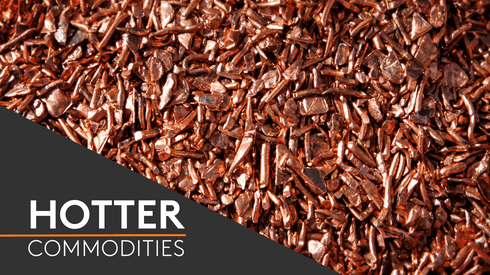Cmdty, which has already raised $10 million in its series A financing, plans to launch its pilot program in the first half of 2020. The goal is to use technology to streamline the physical commodities supply chain and to dramatically improve the way that physical commodities are traded, transacted and transported.
“How can it be that I can easily buy and track a pair of shoes online, but I have to call and email around to arrange for the pickup of hundreds of thousands of dollars-worth of copper and hope that the metal arrives at its final destination?” Evans said.
“The commodities industry is clearly ripe for technological innovation,” he added.
Evans, who was until recently at global commodities group Concord Resources in New York, said that the genesis of the idea sprang from conversations with Brian O’Kelley, a long-time personal friend known in technology circles as the “ad tech godfather.”
O’Kelley had just sold AppNexus – a start-up digital marketplace for the advertising industry that grew to have 1,200 staff – to United States-based multinational holding company AT&T for $1.6 billion and was looking for an idea for his next project.
The pair began to explore ideas for bringing the same kind of digital innovation to the commodities supply chain, which has operated using the same manual processes for decades.
“We eventually concluded that we could bring together a team of people that could transform the way commodities are traded and transported globally, could help producers, traders and consumers to interact more efficiently, and ultimately could help everyone in the markets to make more money,” Evans said.
Evans brought in Andrea Aranguren, with whom he had worked at Goldman Sachs. A physical logistics expert, Aranguren had gone on to build and optimize supply chains for two start-up companies and also worked for IHS Markit on a commodities document digitization and inventory reconciliation product based on artificial intelligence.
“It’s a unique combination of experts from tech, commodities trading and logistics,” Evans said.
According to Evans, while the commodities boom was an incredibly bullish phenomenon for the metals markets, it interrupted the sector’s growing momentum in digital technology.
“Why spend money investing in technology when it was far more effective to just sell and ship metals as quickly as you could to China?” Evans told Fastmarkets. “I’m convinced that if the commodities boom had not happened, then digital marketplaces for commodities would be significantly more developed.”
There has been some innovation, however, particularly recently, with a plethora of blockchain-based projects being designed to tackle similar issues in the physical commodities supply chain. These include Acquifer Institute, Crypto Commodity Group, Open Mineral and ConsenSys’ Minerac, Metalshub and TradeCloud.
But adoption of these individual platforms has been relatively slow, Evans said, attributing this in part to a lack of interoperability between systems and a mistrust of sharing data.
Cmdty will be a neutral marketplace for everyone, Evans said, with clients brought on board under a Know Your Customer verification processes.
The end-result, he concluded, will be the creation of an experience similar to online retailer Amazon but for the metals supply chain, ranging from mine to market and including trade finance, warehousing, shipping and insurance.




